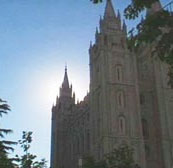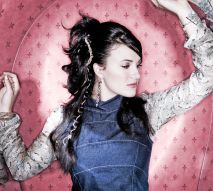 We’re all Mormons. That was the essence, anyway, of the first half of “The Mormons,” the Frontline/American Experience documentary that concluded last night on PBS. The film implies that the founding myth about the United States–that Americans were a pilgrim people persecuted for the purity of their belief who then found freedom in a vast, new empire–so closely resembles the story of the Church of Jesus Christ of the Latter Day Saints that all Americans should attend to their history.
We’re all Mormons. That was the essence, anyway, of the first half of “The Mormons,” the Frontline/American Experience documentary that concluded last night on PBS. The film implies that the founding myth about the United States–that Americans were a pilgrim people persecuted for the purity of their belief who then found freedom in a vast, new empire–so closely resembles the story of the Church of Jesus Christ of the Latter Day Saints that all Americans should attend to their history.
Nor did Monday night’s installment let us off the hook on religious terms. It repeatedly pointed out that LDS founder Joseph Smith’s revelations are no more outlandish than Christ’s resurrection, or the dictation of the Qur’an to Muhammad, or the burning bush–only safely beyond scientific examination. It’s a compelling argument, especially in the mouths of Yale scholar Harold Bloom, evangelical bigs like Richard Mouw, and, of course, a host of reasonable Mormons.
Producer Helen Whitney, whose previous subjects include the papacy and “Faith at Ground Zero,” calls herself an agnostic with a fascination for spiritual devotion. But the Mormons couldn’t wish for a better advocate.
It might even be said that the show tried too hard to help us understand the Mormon mindset. As Monday night wore on, the show’s tone seemed to grow defensive, while some of the rationales it cooked up to explain the darker passages of the Mormon past, notably the Mountain Meadows massacre of settlers passing through Utah territory, stretch our empathy too far.
Last night’s treatment on modern-day Mormonism was more complex but similarly tried to push back at the knee-jerk judgment of the church’s rigid orthodoxy. We heard the testimony of gay Mormons, feminists, and writers who challenge the Book of Mormon’s historical claims (for instance, that Jewish emigrants built cities on American soil 4,000 years ago), several of whom have suffered excommunication.
But the lessons of part one of the documentary are still fresh on the mind: Which American church has not dealt with these issues and has not reasserted orthodxy? Bloom even popped up again to remind us that the Exodus, archeologically speaking, is a phantom and Mouw faintly praised the Mormon impulse to baptize the dead.
The argumentative tone of “The Mormons” robbed the film of moment: it didn’t have the epic sweep we expect from a PBS two-nighter. But it may be a film that we, and certainly the Salt Lake faithful, need right now. As a Mormon candidate is making a first, chancy bid for president and with the current anti-religious backlash drawing a bead on Mormonism (in his recent book, for instance, Christopher Hitchens calls the religion a “racket”), perhaps the Latter Day Saints need all the understanding they can get.


